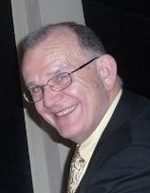Portaferry Proms
 A Celebration of the Irish Voice
A Celebration of the Irish Voice
Review by
George Fleeton
Where can you find, on an autumnal Saturday night, two of the best operatic voices in the country, singing beautiful music drawn from across two centuries, accompanied by string quartet and organ?
The answer is in Portaferry’s 170 year-old Presbyterian Church, an unexpected neo-classical Greek temple with a six columned portico at each end.
This concert was the latest instalment of the fascinating Portaferry Proms (September 15th), in a self-styled Celebration of the Irish Voice, the voices of soprano Lynda Barrett and mezzo-soprano Jenny Bourke.
It was world class, organised by the Friends of Portaferry Presbyterian Church, but deserving of a much bigger audience.
Neither Lynda Barrett nor Jenny Bourke is a stranger here, each having sung at different times either at the annual Opera Fringe Festival (2002-9) or at Castleward Opera (1985-2009).
Lynda’s solo programme opened with Almirena’s plaintive aria, from the second act of Handel’s opera Rinaldo (1711), ‘Lascia ch’io pianga’; followed by Dido’s Lament – ‘When I am laid in earth’ – from the finale of Purcell’s opera from 1689.
Both these operas were first given in London, and both arias were superbly well sung.
Such difficult but well-known examples of baroque music left us in no doubt that this was going to be no ordinary, by-numbers sort of concert.
Jenny’s aria from Gluck’s opera Orfeo ed Euridice (1762) – ‘Che faro senza Euridice?’ – was particularly poignant, given that it was among Callas’ greatest recordings, and heard in Portaferry on the evening before the 35th anniversary of her death.
This was followed by Harty’s setting of My Lagan Love, from 1903, somewhat of a cuckoo in this celebration nest of much earlier music.
But it was when the two voices came together that this concert achieved new heights: Franck’s Panis Angelicus, written for the liturgy of Corpus Christi, in 1872, and the Laudamus Te from Vivaldi’s Gloria, from around 1708.
Each of these timeless examples of church music was accompanied by Richard Campbell on organ.
Part one of the concert – a very compact 40 minutes – then ended on two much lighter notes: the Act 1 barcarolle duet from Delibes’ 1883 opera Lakmé, followed by Danny McCann-Williams and the Ulster String Quartet’s rendition of Bach’s Lunch.
This syncopated piece was ‘borrowed’ for the night from the Turtle Island Quartet’s repertoire – jokey jazz at its very best.
Part two was as uplifting as it was unanticipated:
Pergolesi’s Stabat Mater Dolorosa, a sequence from the Good Friday liturgy, written in the 1730s, and exemplifying baroque sacred music at its very best.
For a piece such as this, however, the audience needs some guidance on when (or when not to applaud) and a few words after the interval would have avoided some early and unnecessary applause.
That said, this piece proved beyond a doubt just what experienced professionals Barrett and Bourke have become.
Afterwards there was a well-appreciated informal reception for all in Portaferry Regeneration’s Barholm premises.
Such events continue at Portaferry Proms 2012 with a Harvest Festival on October 21st headlined by the Newquay Singers, and with a Carol Service on December 23rd.
George Fleeton writes independently on arts and culture and teaches opera and cinema in higher education.
























